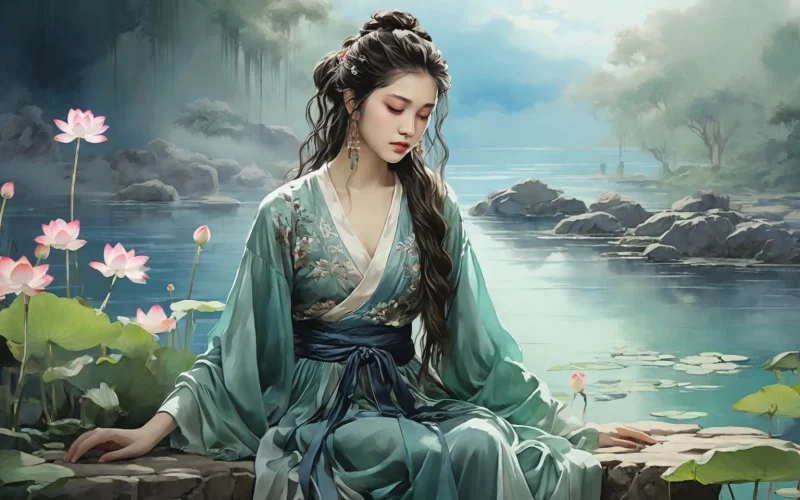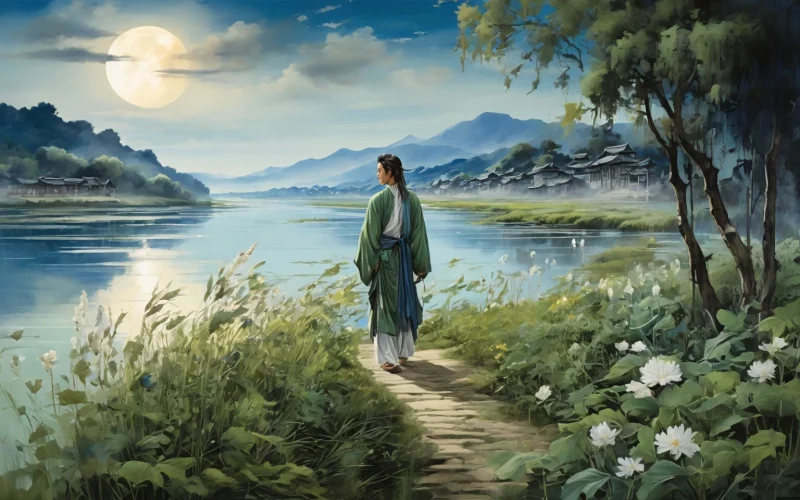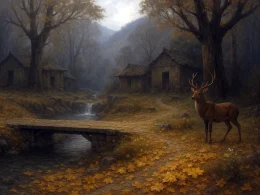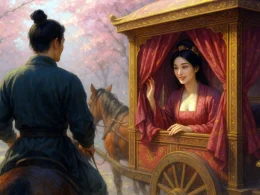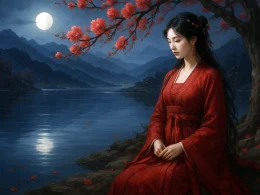When leaves fell in decay, you left the western bay,
But you have not come back now lotus blossoms sway.
My dream oft lingers on the stream or by the fountain,
But you are said to be far away in the mountain.
Original Poem
「江南行」
张潮
茨菰叶烂别西湾,莲子花开犹未还。
妾梦不离江上水,人传郎在凤凰山。
Interpretation
This poem "Song of the Southern Rivershore" by Tang dynasty poet Zhang Chao may not be among the most celebrated ancient-style verses, yet it captures with exquisite delicacy the profound longing of a merchant's wife for her faraway husband. Adopting a feminine voice, the poem employs "dreams" and "waters" as leitmotifs, weaving seasonal changes and shifting landscapes of the Jiangnan region into a tapestry of emotional undulations, embodying the subtle melancholy characteristic of southern folk ballads.
First Couplet: "茨菰叶烂别西湾,莲子花开犹未还。"
Cí gū yè làn bié xī wān, lián zǐ huā kāi yóu wèi huán.
We parted at West Cove when arrowhead leaves browned,
Now lotus blooms unfold—still you're not homebound.
The opening couplet establishes the temporal and spatial coordinates of separation. The seasonal transition from "arrowhead leaves browned" (autumn's decay) to "lotus blooms unfold" (summer's vitality) maps the protracted waiting period onto nature's cycle. The withered leaves mirror the chill of departure, while the vibrant flowers ironically underscore the wife's solitude—nature's renewal contrasting with human stasis.
Second Couplet: "妾梦不离江上水,人传郎在凤凰山。"
Qiè mèng bù lí jiāng shàng shuǐ, rén chuán láng zài fèng huáng shān.
My dreams still haunt the river's flow,
Yet word now places you on Phoenix Hill.
Here the emotional trajectory shifts from patient waiting to obsessive dreaming. The "river's flow" represents both the physical path of the husband's journey and the subconscious currents of the wife's yearning. The sudden mention of "Phoenix Hill" disrupts this liquid dreamscape with terrestrial solidity—a geographical and emotional rupture that heightens the separation's poignancy. The couplet's dramatic turn reveals how rumors can shatter imagined proximities, transforming watery visions into mountainous distances.
Holistic Appreciation
Though brief—just four lines—this poem unfolds like a miniature novel, with layered narrative, temporality, and emotion. The opening couplet uses seasonal shifts to convey the duration of longing, compressing the agony of waiting into nature’s cycles. The latter lines introduce dreams as a portal to inner persistence, culminating in the abrupt revelation that "they say my love is at Phoenix Mountain"—a cliffhanger that leaves the reader suspended in melancholy.
Particularly striking are the paired images of "river waters" and "Phoenix Mountain," one fluid and one solid, weaving tangible and intangible realms. The geographical leap mirrors emotional flux and rupture. The poet never names the woman’s grief or resentment, leaving silence to reverberate beyond the text with folk lyricism’s classic restraint.
Artistic Merits
With economical yet natural diction, the poem masterfully choreographs time and emotion, interlacing separation’s pain, longing’s intensity, and the sorrow of uncertain news in just four lines. The poet excels at scene-catalyzed emotion: "lotus leaves rotting" and "lotus blossoms blooming" thread the timeline of feeling, while "dreams" and "river waters" mirror the psyche. The finale’s abrupt revelation lingers like an aftertaste, achieving the folk-song aesthetic of "depth within simplicity."
Insights
While depicting a woman yearning for a distant traveler, the poem taps into a timeless universality. Separation, uncertain news, and unspoken affection are human experiences transcending eras. Through plainspoken precision, the poet awakens the reader’s own echoes of waiting and loss, proving how authentic emotion pierces through literature. It reminds us: truly moving poetry relies not on ornate phrasing but on emotional truth and resonant detail.
Poem translator
Xu Yuanchong(许渊冲)
About the Poet
Zhang Chao(张潮), a Tang dynasty poet from Danyang, Jiangsu, primarily depicted Jiangnan landscapes and feminine sensibilities in his works. Though only five of his poems survive in the Complete Tang Poems (Quan Tangshi), his subtle lyricism marks him as a pivotal transitional figure in Mid-Tang Jiangnan poetry.






